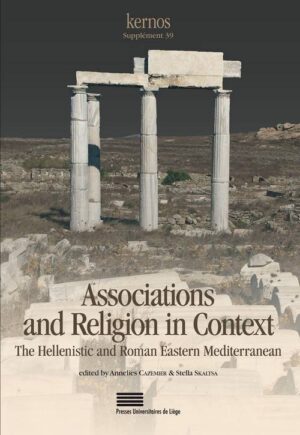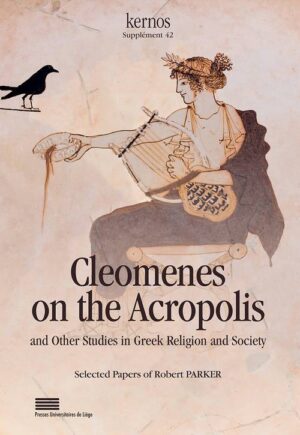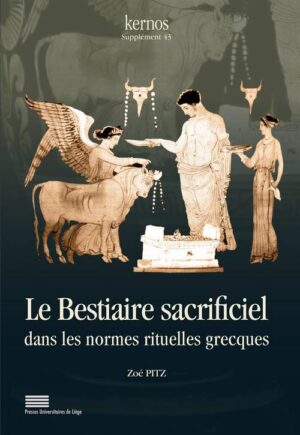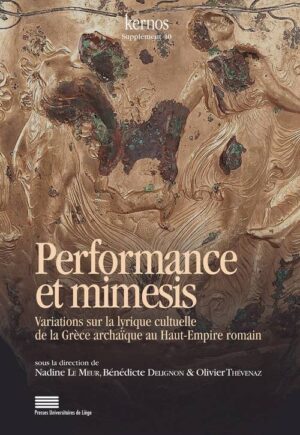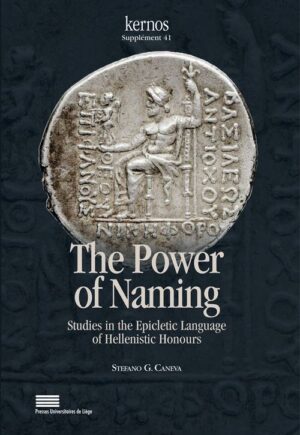-
The Hellenistic and Roman Eastern Mediterranean edited by Annelies CAZEMIER & Stella SKALTSA The terms ‘religious association’ or ‘cult association’ are regularly used in scholarship, but their use and applicability have been in need of critical re-assessment for some time. In an attempt to find a more nuanced approach and gain a better understanding of the formation, organisation, and aims of ancient associations, this volume seeks to elucidate the wider context(s) of associations’ religious as well as social and cultural dimensions. A series of questions have shaped the volume’s agenda: How and to what extent did religion inform the activities of ancient associations? What was the role of so-called religious associations in promoting social, political, cultural, and/or economic life in post-classical poleis? What role did religion play in associations’ self-representation and in their relations with individuals, groups, local authorities, and/or external powers? To what extent were associations responsible (within their region or more widely) for religious innovation, for example the introduction of new cults or the introduction of new cultic practices? All in all, the papers demonstrate that important insights can be gained from considering the multifarious aspects of associations in close conjunction. They illustrate how the various dimensions (religious, social, funerary, etc.) of associative life are closely connected, with religious aspects usually taking a prominent place. These aspects informed and expressed associations’ internal dynamics as well as their outward group identity and self-representation. Cultic activities and affiliations ultimately inform us about the places of private collectivities in society more broadly. Table des matières (PDF) Abstracts (PDF)
-
Selected Papers of Robert PARKER Robert Parker, Wykeham Professor emeritus of Ancient History at Oxford, is one of the leading contemporary experts on ancient Greek religion, as demonstrated by the various monographs he has published on the subject. Alongside books such as Polytheism and Society at Athens (2005), On Greek Religion (2011) and Greek Gods Abroad (2017), he has written dozens of articles that enrich his contribution to this field of study. The most important of them are here collected, with an updated afterword when necessary. The four headings that divide them up bear witness to their author’s ongoing concerns: Religion and Society, Divination, Sacrifice, and the close relationship between Gods and their Names. The collection ends with the outrageous ‘small god’ Priapos, who stood in image form in gardens and threatened thieves with a dire punishment inflicted by his giant phallos. Table des matières (PDF)
-
Zoé PITZ En Grèce ancienne, le sacrifice d’un animal domestique avait une portée alimentaire, mais était surtout un acte rituel destiné à interagir avec le monde supra-humain. Dans le cadre de sacrifices offerts par des particuliers, le choix de l’animal était généralement laissé au sacrifiant en fonction de ses moyens financiers. En revanche, pour les sacrifices accomplis dans le cadre de cultes officiels et publics, la sélection de l’animal faisait l’objet d’une réglementation stricte. Les normes rituelles constituent un corpus particulièrement adapté à l’étude des associations rituelles entre dieux et animaux : ces inscriptions produisent en effet de nombreuses prescriptions concernant les caractéristiques des animaux offerts en contexte public, comme leur espèce, leur sexe, leur âge, et même parfois leur couleur. Cependant, les règlements cultuels ne disent rien du fondement de ces choix. Quels étaient dès lors les critères qui justifiaient la sélection d’un animal plutôt qu’un autre pour une divinité donnée ? Cette question se trouve au cœur de l’ouvrage, qui entend ainsi contribuer à une meilleure compréhension des pratiques sacrificielles grecques à l’échelle panhellénique, mais aussi locale. Table des matières (PDF)
-
Variations sur la lyrique cultuelle de la Grèce archaïque au Haut-Empire romain Nadine LE MEUR, Bénédicte DELIGNON & Olivier THÉVENAZ (dirs) Les chants cultuels grecs archaïques étaient conçus pour être exécutés devant la communauté lors de fêtes religieuses en l’honneur de divinités. Tout au long de leur réception riche et variée, ils ont été transposés dans de nouveaux contextes où ils ont pris d’autres fonctions. Articulant les notions de performance et de mimesis, le présent volume s’intéresse aux processus de recréation poétique dont ces chants ont fait l’objet depuis l’époque classique jusqu’au Haut-Empire romain. Dans un cadre chronologique large, à partir de sources variées (le théâtre, le récit mythologique, les multiples formes lyriques grecques et latines) conservées sur différents supports (notamment épigraphiques et papyrologiques), les études ici rassemblées explorent la richesse du dialogue de la poésie grecque et latine avec l’hymne archaïque, ainsi que la complexité des rapports au réel et à ses représentations que peut impliquer le geste mimétique. Fruit de recherches menées par des spécialistes internationaux, il témoigne de la fécondité des collaborations entre hellénistes et latinistes sur ces questions de poétique qui touchent également aux domaines religieux et social. Table des matières (PDF) Abstracts (PDF)
-
Studies in the Epicletic Language of Hellenistic Honours Stefano G. CANEVA This book focuses on the contribution of epithets and compound denominations to the definition of the religious figure of sovereigns and other political leaders in the Hellenistic world, from Philip II and Alexander III to Kleopatra VII and the beginning of the Roman Principate. Questions and methodologies related to the political history of the Hellenistic Mediterranean are combined with the results of recent studies in the functioning of the Greek epicletic system to provide a fresh reassessment of the entanglement between honorific practices and the religious life of Hellenistic communities, from continental Greece to Egypt, from Syracuse to Bactria. Reconsidering the relationships between honours and religion also implies reversing the question of the influence of Greek religion on Hellenistic ruler cults to explore how a new tradition of ritual encounters between human power and the divine sphere may have impacted post-classical developments in Greek polytheism. Table des matières (PDF)

